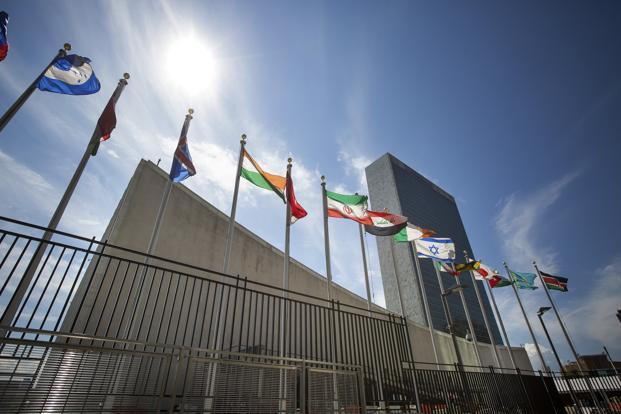“Entirely Internal Matter,” Says India After UNSC Closed Door Meet On J&K:
 UNITED NATIONS : The UN Security Council on Friday began a rare closed door meeting to discuss India revoking the special status of Jammu and Kashmir after Pakistan, backed by its all-weather ally, China, requested “closed consultations” on the issue.
UNITED NATIONS : The UN Security Council on Friday began a rare closed door meeting to discuss India revoking the special status of Jammu and Kashmir after Pakistan, backed by its all-weather ally, China, requested “closed consultations” on the issue.
The outcome of the UNSC meeting will not be a formal pronouncement as the consultations are informal in nature. India and Pakistan are not attending the meeting, which is open only to the five permanent members and 10 non-permanent members.
The Russian envoy apparently suggested India and Pakistan to take bilateral route on the basis of Simla Agreement of 1972 and Lahore declaration of 1999, and in accordance with UN Charter, relevant UN resolutions and other bilateral agreements.
China, a permanent member of the UNSC and close ally of Pakistan, had asked for “closed consultations” in the Council, which began its deliberations at 10 am (7:30pm IST) in the Security Council Consultations Room.
Meanwhile, the offices of the Jammu and Kashmir government are functioning normally in the Valley, while schools will reopen next week, Jammu and Kashmir Chief Secretary BVR Subrahmanyam has said.
Addressing a press conference in Srinagar, the top bureaucrat said there has been no loss of life or major injury since restrictions were imposed on August 5, when the special status given to Jammu and Kashmir was abrogated and the state was bifurcated into two Union Territories.
The Supreme Court had earlier today said it will wait for some time before passing any direction on the plea seeking removal of restrictions on the media in Jammu and Kashmir.
A bench comprising Chief Justice Ranjan Gogoi and justices S A Bobde and S A Najeer said, “We would like to give little time. We have read in newspaper today that landline and broadband connections are being restored gradually.
Therefore, we will take up the petition with other connected matters,” the bench said.”The landlines are working. We also got a call today from the CJ of J-K HC,” the bench further said. “We will see when the matter can be listed for hearing. We will fix a date on the administrative side,” the bench said.
Advocate Vrinda Grover, appearing for Anuradha Bhasin, Executive Editor, Kashmir Times, said there was a need for early restoration of communication mode for journalists to carry out their work. “My matter is related to freedom of press,” Grover said and added it had nothing to do with Article 370. At this point, the bench said it can also refer this matter to the bench which on Tuesday had entertained a similar petition.
Another bench, headed by Justice Arun Mishra, on Tuesday had refused to interfere with the Centre and Jammu and Kashmir government imposing several restrictions, saying “reasonable time” be given for bringing normalcy in the sensitive situation and had decided to hear the issue after two weeks.
Attorney General KK Venugopal expressed surprise why Kashmir Times was not published from Srinagar. “So far the situation is concerned it would gradually be settled and, therefore, there is no need to jump to any conclusion,” Venugopal said.
Solicitor General Tushar Mehta submitted that there was no need to entertain the petition seeking lifting of curbs on media. He said people should trust the security forces deployed in Jammu and Kashmir and authorities are taking stock of situation on day-to-day basis.He said some time should be given to bring normalcy in the region.
The petition filed by Bhasin had sought removal of restrictions imposed on working of journalists in the state after scrapping of provisions of Article 370.
Bhasin has sought restoration of all modes of communication, including mobile Internet and landline services, throughout the state in order to provide an enabling environment for the media to practise its profession.
In the petition, the editor said she is seeking a direction for the Centre and the Jammu and Kashmir administration to immediately relax all restrictions on freedom of movement of journalists and media personnel in Kashmir and some districts of Jammu.
The direction was sought in order to enable media personnel to practise their profession and exercise their right to report in furtherance of their rights under Article 14, 19 (1) (a) and 19 (1) (g) and 21 of the Constitution as well as the right to know of residents of Kashmir Valley, the petition said.
The editor submitted that since August 6 the newspaper’s Kashmir edition has not been printed and published as complete and absolute restrictions on communication services and movement has resulted in the imposition of a de facto blockade on media activities, including reporting and publishing on the situation in the valley.
ambassador Zhang Jun.(With Agency Inputs ).

